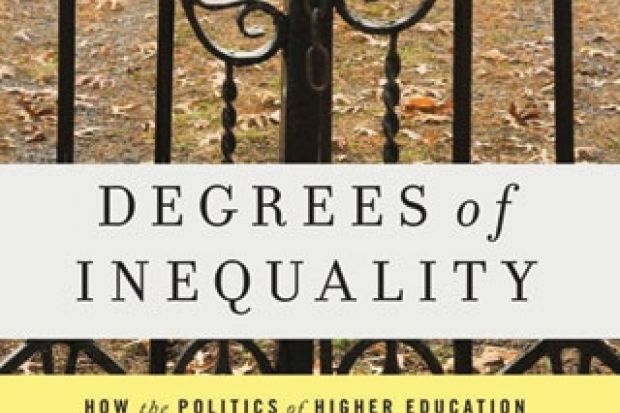When I was living in Atlanta in 1994, a Georgia politician was the centre of national attention. In the aftermath of the Congressional mid-term elections, Newt Gingrich held sway as the Speaker of the House. For a time, he seemed to be the most powerful politician in the land as he stood on the verge of bringing the government to a standstill.
In the end, he was comprehensively outmanoeuvred by “Slick Willie”, aka President Bill Clinton. A combination of hubris and vanity brought Gingrich crashing down. He never had it in him to attain such prominence again, as his abortive run for the White House in 2012 demonstrated.
But Gingrich’s legacy has been profound. In Degrees of Inequality, Suzanne Mettler argues that the political partisanship of the 1990s was a watershed for US politics, including higher education policy. From then until the present day, consensus became a dirty word as opinion polarised and “gridlock” set in.
That change in political culture had profound consequences for higher education. Whereas in the past, the expansion of affordable higher education was a common goal among politicians; now, the value of student grants has been sustainably eroded and student loans are increasingly expensive. In turn, this has affected access to prestigious state and private universities.
Mettler brings a fresh and original analysis to bear. She argues that maintaining the “policyscape” – that is, a political landscape of past policies – has been neglected. The consequence is that while traditional aspirations for higher education and their part in realising the American dream remain, the failure to renew and refresh policies led to deleterious consequences.
Yet the almost iconic status she affords to the era of higher education bipartisanship makes Mettler a very harsh – and arguably unreasonable – critic of recent changes. A “GI Bill for the 21st Century”, instituted in 2009 in response to renewed US military commitments overseas, was a real accomplishment. Already it has given many ex-servicemen and women the opportunity to enter higher education.
President Barack Obama also secured the virtual abolition of the role of private lenders in favour of a “direct loan” scheme administered by the federal government. Mettler is churlish in her acknowledgement of this achievement, which, given the amount of political capital expended by Obama on healthcare reform, was a considerable one.
But she reserves her full ire for the role now played by for-profit higher education providers. While they make the seductive claim of tackling inequality via the market, the charge sheet against them is long and compelling. According to Mettler, it includes low retention rates, variable student experiences and poor graduate employment prospects. While she claims not to be against private providers in principle, it is hard to see what they could do to satisfy her.
But was there ever a golden age of social equality and university entrance in the US? America’s expansion of access, not unlike that of the UK, had much to do with a growing and more affluent middle class and increased participation by young women. However, just as in the UK, students from the poorest parts of the US had never entered higher education in great numbers.
A British observer is bound to ask whether there are lessons for the UK in Mettler’s analysis. Of course politicians disagree in this country, but higher education policy has been an area of remarkable consensus over the past 30 years, if not longer. Whether that consensus holds through the next election remains to be seen, particularly if Labour retains its present policy on tuition fee levels.
But even if this happens, Britain has no Tea Party equivalent making it an article of faith to cut spending regardless of the consequences. Moreover, it is hard to imagine UK politicians responding too eagerly to Mettler’s analysis that states that tax their citizens more are able to spend more on higher education.
As for the for-profit sector, it is a small part of the British landscape and is likely to remain so for years to come. Even if it grows, it is unlikely to receive the kind of preferential treatment and political support that it enjoys in the US. Nonetheless, Mettler’s warnings should be heeded when there is loose talk about “lowering barriers to entry”.
I left the US with the vivid realisation that it was indeed a foreign country. Twenty years on, that certainly remains the case when it comes to higher education.
Degrees of Inequality: How the Politics of Higher Education Sabotaged the American Dream
By Suzanne Mettler
Basic Books, 320pp, £18.99
ISBN 9780465044962
Published 20 March 2014
Register to continue
Why register?
- Registration is free and only takes a moment
- Once registered, you can read 3 articles a month
- Sign up for our newsletter
Subscribe
Or subscribe for unlimited access to:
- Unlimited access to news, views, insights & reviews
- Digital editions
- Digital access to THE’s university and college rankings analysis
Already registered or a current subscriber?





